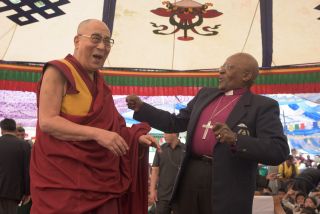Gratitude
Mission Impossible? Seeing Joy in a New Light
Science proves joy is good for us. So how do we get more of it?
Posted January 11, 2023 Reviewed by Davia Sills
Key points
- Science proves that joyful people live healthier, longer lives.
- Micro-acts of joy can improve one's quality of life.
- Gratitude increases joy automatically, even for a moment, and forgiveness increases happiness.

Over 350 million people worldwide battle depression. According to the World Health Organization, depressive disorders have increasingly impacted adolescents, in particular, over the past decade. Depression affects not only individuals but entire systems, with an estimated cost on the global economy reaching around $1 trillion U.S. annually in productivity losses.
We have plenty of reason to be concerned about the direction in which our world is headed. Even those who are not struggling with depression and anxiety have experienced challenges that are core-shaking. The aftershock of the global pandemic has reorganized the way we live our lives. So how do we find alignment in a misaligned world?
It takes leaders who inspire by example but also an individual effort to stay the course in the rockiest of times. Quite simply, we need more joy. It may sound pat, and even a little annoying, to suggest that joyful living is possible when these dark times seem to overshadow everything else. Our minds have a negativity bias that pays attention to negative events more readily than positive ones. But exciting research is emerging about the positive influence joy can have on our immune systems, our brains, and our longevity. It is worth taking a look at the resilience factor joy can bring to our lives.
The recent documentary Mission: Joy highlights two world leaders who have met their share of adversity and suffering: Archbishop Desmond Tutu, who successfully contributed to the end of South African apartheid, and His Holiness The Dalai Lama, who had to flee his home country of Tibet in the 1950s as a young man. The film gently showcases their years-long friendship filled with laughter and grace. It is a moving tribute not only to their work but also to the power of joy itself.
These two characters could not be further apart in terms of their backgrounds: One grew up in a 1,000-room palace (The Dalai Lama), and the other grew up in poverty in South Africa (Tutu) with an abusive, alcoholic father. One lost his homeland; the other fought to get his back. And yet they rose to be religious leaders in their own right, sharing a common human quality despite the suppression and rejection they experienced in their lives: Joy is what brought them together when the world was seemingly tearing everything else apart.
Joy is not reserved for the famous and influential. It is possible for everyone. Spoiler alert: According to Mission: Joy, the key to living a joyful life begins with compassion for self and for others. And compassion comes mostly from suffering. No matter what happens, we still have a choice: desperation or joy. Which will it be?
In a recent Skype interview, the film's director and producer, Peggy Callahan, discussed her commitment to improving other people's lives. Together with the University of California, Berkeley, she helped launch the largest-ever citizen science project on joy, called BIG JOY, which challenges participants to engage in micro-acts of joy for seven minutes a day for seven days. The goal is to determine which micro-acts work best for each participant. Preliminary results from 198 countries, 194,210 micro-acts of joy, and over 47,300 participants suggest that after just one week, people felt 23 percent more joyful.
Micro-acts can span from engaging in an act of kindness to writing a gratitude list, reframing our perspective, or practicing forgiveness. Perhaps the most helpful insight from the project is the realization that we do have agency over our lives. We cannot control external factors, but we can control our internal world. To paraphrase The Dalai Lama, joy is an inside job.
Here is what Callahan had to say about joy and the film.
What made you want to executive produce and direct this documentary?
Douglas Abrams, who wrote The Book of Joy with Archbishop Tutu and The Dalai Lama, is a really good friend of mine. He called me to tell me about the book project and asked if I wanted to do a film based on it. I jumped at the chance! I have never seen such intense, beautiful, life-giving love between two men. This love is bigger than anything else. Their beliefs are based on a higher calling.
In what ways is joy good for us?
Joy is that clean energy that fuels every transformation we seek. Happier, joyful people make better leaders. They are more productive, more resilient, and they live longer. If you want to have a good life, figure out the joy equation. Of course, it is different for different people. Figure out what it is that gives you joy and live there.
For me, it is awe. The thing about awe is that it keeps increasing over the day as you experience it. Taking nature walks contributes to it. In fact, the stuff that stays at the top of my head after a long walk is what flows into the film. The BIG JOY project showcases the science behind it. Joy is good for us. Period.
If joy is so good for us, why is it sometimes hard to get it?
It is difficult when you are caught in the swirl of darkness, but this I know: Gratitude and sadness cannot live in the same room. Counting what you are grateful for automatically inserts joy into your life, even for a moment. No one can make that choice for you. It is yours and yours alone.
In Mission: Joy, watching those men laugh opens your heart to take in the information that is not so easy to accommodate. My intention was to reach out in a way so that you can't dismiss them—either as leaders or as people. Our humanity is greater than our differences.
Archbishop Tutu and The Dalai Lama both agree that giving to others provides the most joy. What can people who feel so strapped and burnt out do to muster the energy to help not just themselves but others, too?
People are so desperate for the message and to figure out what works for them. There are teaspoon-sized things people can do. If people engage in an act of kindness, no matter how small (smiling at someone), the first person they help is themselves. It gives them a tiny hit of feeling elevated. I am not talking about depression, which is a separate mental health issue. But if you are feeling out of alignment, these micro-acts of joy, such as forgiveness or gratitude, can make you feel better. The science proves it. A tiny smile does make you feel better.
Joy comes in many forms. As The Dalai Lama says, it is a practice that takes practice. What better time to start than now?




